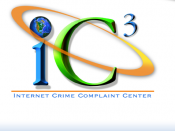Great Paper Excellent essay
Computer Crime
by: Manik Saini
Advances in telecommunications and in computer technology have brought us to the information revolution. The rapid advancement of the telephone, cable, satellite and computer networks, combined with the help of technological breakthroughs in computer processing speed, and information storage, has lead us to the latest revolution, and also the newest style of crime, 'computer crime'. The following information will provide you with evidence that without reasonable doubt, computer crime is on the increase in the following areas: hackers, hardware theft, software piracy and the information highway. This information is gathered from expert sources such as researchers, journalists, and others involved in the field.
Computer crimes are often heard a lot about in the news. When you ask someone why he/she robbed banks, they world replied, 'Because that's where the money is.' Today's criminals have learned where the money is. Instead of settling for a few thousand dollars in a bank robbery, those with enough computer knowledge can walk away from a computer crime with many millions.
The National Computer Crimes Squad estimates that between 85 and 97 percent of computer crimes are not even detected. Fewer than 10 percent of all computer crimes are reported this is mainly because organizations fear that their employees, clients, and stockholders will lose faith in them if they admit that their computers have been attacked. And few of the crimes that are reported are ever solved.
Hacking was once a term that was used to describe someone with a great deal of knowledge with computers. Since then the definition has seriously changed. In every neighborhood there are criminals, so you could say that hackers are the criminals of the computers around us. There has been a great increase in the number of computer
break-ins since the Internet became popular.
How serious is hacking? In 1989, the Computer Emergency Response Team, a organization that monitors computer security issues in North America said that they had 132 cases involving computer break-ins. In 1994 alone they had some 2,341 cases, that's almost an 1800% increase in just 5 years. An example is 31 year old computer expert Kevin Mitnick that was arrested by the FBI for stealing more then $1 million worth in data and about 20,000 credit card numbers through the Internet. In Vancouver, the RCMP have arrested a teenager with breaking into a university computer network. There have been many cases of computer hacking, another one took place here in Toronto, when Adam Shiffman was charged with nine counts of fraudulent use of computers and eleven counts of mischief to data, this all carries a maximum sentence of 10 years in jail.
We see after reading the above information that hacking has been on the increase. With hundreds of cases every year dealing with hacking this is surely a problem, and a problem that is increasing very quickly.
Ten years ago hardware theft was almost impossible, this was because of the size and weight of the computer components. Also computer components were expensive so many companies would have security guards to protect them from theft. Today this is no longer the case, computer hardware theft is on the increase.
Since the invention of the microchip, computers have become much smaller and easier to steal, and now even with portable and lap top computers that fit in you briefcase it's even easier. While illegal high-tech information hacking gets all the attention, it's the computer hardware theft that has become the latest in corporate crime. Access to valuable equipment skyrockets and black-market demand for parts increases. In factories, components are stolen from assembly lines for underground resale to distributors. In offices, entire systems are snatched from desktops by individuals seeking to install a home PC. In 1994, Santa Clara, Calif., recorded 51 burglaries. That number doubled in just the first six months of 1995. Gunmen robbed workers at Irvine, Calif., computer parts company, stealing $12 million worth of computer chips. At a large advertising agency in London, thieves came in over a weekend and took 96 workstations, leaving the company to recover from an $800,000 loss. A Chicago manufacturer had computer parts stolen from the back of a delivery van as he was waiting to enter the loading dock. It took less then two minutes for the doors to open, but that was enough time for thieves to get away with thousands of computer components.
Hardware theft has sure become a problem in the last few years, with cases popping up each day we see that hardware theft is on the increase.
As the network of computers gets bigger so will the number of software thief's. Electronic software theft over the Internet and other online services and cost the US software companies about $2.2 billion a year. The Business Software Alliance shows that number of countries were surveyed in 1994, resulting in piracy estimated for 77 countries, totaling more than $15.2 billion in losses. Dollar loss estimates due to software piracy in the 54 countries surveyed last year show an increase of $2.1 billion, from $12.8 billion in 1993 to $14.9 billion in 1994. An additional 23 countries surveyed this year brings the 1994 worldwide total to $15.2 billion.
As we can see that software piracy is on the increase with such big numbers.
Many say that the Internet is great, that is true, but there's also the bad side of the Internet that is hardly ever noticed. The crime on the Internet is increasing dramatically. Many say that copyright law, privacy law, broadcasting law and law against spreading hatred means nothing. There's many different kinds of crime on the Internet, such as child pornography, credit card fraud, software piracy, invading privacy and spreading hatred.
There have been many cases of child pornography on the Internet, this is mainly because people find it very easy to transfer images over the Internet without getting caught. Child pornography on the Internet has more the doubled on the Internet since 1990, an example of this is Alan Norton of Calgary who was charged of being part of an international porn ring.
Credit card fraud has caused many problems for people and for corporations that have credit information in their databases. With banks going on-line in last few years, criminals have found ways of breaking into databases and stealing thousands of credit cards and information on their clients. In the past few years thousands of clients have reported millions of transactions made on credit cards that they do not know of.
Invading privacy is a real problem with the Internet, this is one of the things that turns many away from the Internet. Now with hacking sites on the Internet, it is easy to download Electronic Mail(e-mail) readers that allows you to hack servers and read incoming mail from others. Many sites now have these e-mail readers and since then invading privacy has increased.
Spreading hatred has also become a problem on the Internet. This information can be easily accessed by going to any search engine for example http://www.webcrawler.com and searching for 'KKK' and this will bring up thousands of sites that contain information on the 'KKK'. As we can see with the freedom on the Internet, people can easily incite hatred over the Internet.
After reading that information we see that the Internet has crime going on of all kinds.
The above information provides you with enough proof that no doubt computer crime is on the increase in many areas such as hacking, hardware theft, software piracy and the Internet. Hacking can be seen in everyday news and how big corporations are often victims to hackers. Hardware theft has become more popular because of the value of the computer components. Software piracy is a huge problem, as you can see about $15 billion are lost each year. Finally the Internet is good and bad, but theirs a lot more bad then good, with credit card fraud and child pornography going on. We see that computer crime is on the increase and something must be done to stop it.



10th grade?
This seems like it's been copied from somewhere (what with being a 4 page essay), but if not, congratulations.
5 out of 5 people found this comment useful.